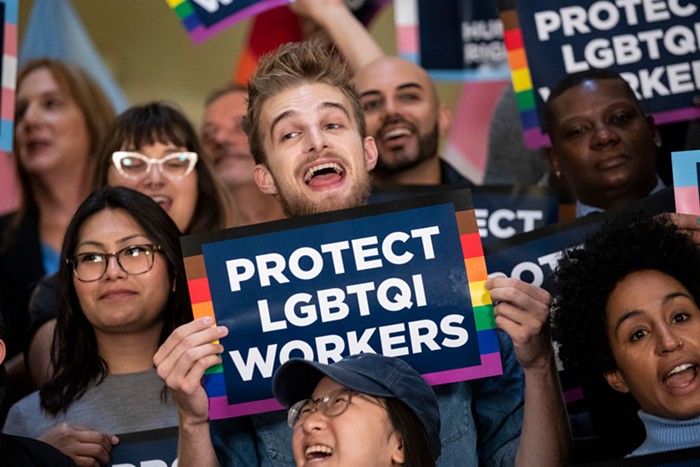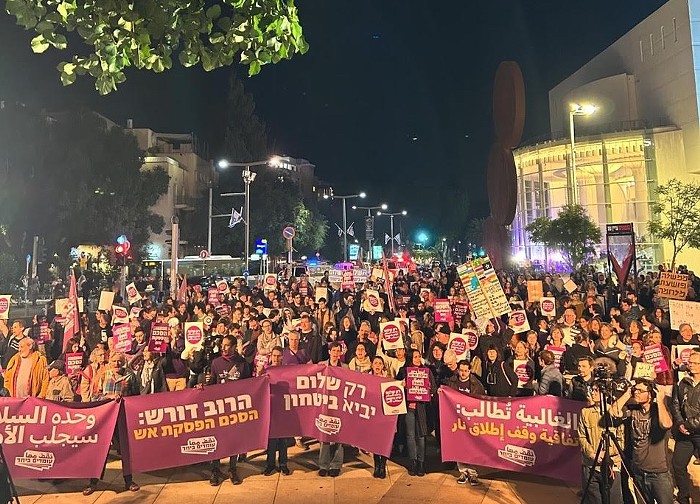
This week, the Supreme Court heard oral arguments in a case that has brought together two groups that don't generally coalesce: conservative Christians and radical feminists.
The case, which is being considered along with two others in which employees were fired for being gay, is Harris Funeral Homes v. Equal Employment Opportunity Commission. It concerns the firing of Aimee Stephens, who was terminated from her position as a funeral director at Harris Funeral Homes in Livonia, Michigan, in 2013, two weeks after coming out as transgender. Harris, a Christian business, had a strict dress code: Men had to wear pants and women to wear skirts. Stephens, who identifies as a woman, wanted to wear skirts and was dismissed soon after coming out to her colleagues and employer. According to Stephens' former boss, she was fired for violating the dress code, which he said “disrupted the grieving and healing process” of “clients mourning the loss of their loved ones.”
Stephens contacted the ACLU and filed a complaint with the Equal Employment Opportunity Commission (EEOC) arguing that she’d been discriminated against on the basis of her transgender status. The EEOC agreed and took her case to court in the Eastern District of Michigan. In 2016, the court found in favor of Harris. In its decision, the court said that gender identity, unlike sex or race, is not a protected class, and that under the Religious Freedom Restoration Act (which Bill Clinton signed into law in 1993), Harris’s owner was within his rights to fire Stephens if she would not conform to the dress code, as long as it was evenly applied to both men and women.
The EEOC appealed the court’s decision, and in 2018, the Sixth Circuit court reversed the lower court’s decision and found in Stephens’ favor. The court’s decision, in part, relied on the 1989 case Price Waterhouse v. Hopkins, which bars employers from discriminating against employees who fail to conform to sex-based stereotypes.
After the Sixth Circuit’s ruling, Harris appealed to the Supreme Court, which, unfortunately for Stephens, agreed to take on the case. Stephens is being represented by the ACLU, and the funeral home is being represented by the conservative Alliance Defending Freedom (ADF), a group that advocates for, in their words, “religious freedom, the sanctity of life, and marriage and family.” And this is where things start to get weird, because it’s not just the hardcore right-wing, anti-choice, anti-gay, anti-trans Christians backing Harris, it’s also a group of radical feminists.
In August, the radical feminist group the Women’s Liberation Front (WoLF) filed an amicus brief in support of Harris Funeral Homes. “WoLF’s interest in this case stems from its interest in protecting the safety and privacy of women and girls and preserving women’s sex-based civil rights,” the brief reads. “Those rights have been threatened by recent court decisions and agency policies that embrace the vague concept of ‘gender identity’ in a manner that overrides statutory and Constitutional protections that are based explicitly on ‘sex,’ which is precisely what Respondents are asking the Court to do here.”
WoLF goes on to argue that Stephens is trying to redefine “female” from an immutable, biological category to, basically, a feeling: If you say you’re female, you are one. And if the court rules in her favor, according to WoLF, it will threaten the protection of females in all manner of ways, including in sex-segregated spaces like prisons, locker rooms, and shelters for abused women.
“We care about the rights and privacy and safety of women and girls and women and girls are female human beings. Male human beings, by definition, are not female,” WoLF board member Kara Danksy told me.
This case is clearly important. It is the first trans civil rights case ever heard by the Supreme Court, and it could have major implications for both trans and gay people. (The two other cases the court is hearing are both over gay men who got fired for their sexuality.)
In 26 states, it is legal for transgender workers to be fired due to their gender identity, and many people have argued that if Harris wins, this could overturn employment protections for anyone who doesn’t conform to gender stereotypes. That could, in effect, impact every woman who wears pants to work in America. “Should the court decide in favor of Harris Funeral Homes, the employment protections for trans people under Title VII might no longer protect anyone’s gender nonconformity,” wrote Melissa Gira Grant in the New Republic. “The most retrograde gender norms could again rule the American workplace.”
Dansky, however, says that’s a misunderstanding of the law. “People who make the argument that ruling in favor of Harris is bad for gender-nonconforming people are really skewing the issue,” she says. “Price Waterhouse already protects people who don't conform to gender stereotypes. Aimee Stephens could have said, ‘I am a man who wants to wear a skirt and Price Waterhouse protects me.’ If Stephens were saying that, WoLF may very well have filed a brief in agreement. But Aimee Stephens is saying, ‘I am a woman, and women wear skirts.’ That should be deeply offensive to any truly gender non-conforming people, and we object to it.”
Of course, it's the Supreme Court. Their decision in this case could limit or narrow the precedent set by Price Waterhouse.
WoLF's argument has not gone over well with trans activists and allies, and the two sides clashed outside the Supreme Court during oral arguments this week. Speakers from WoLF were drowned out by trans and gay activists, who sang “We Shall Overcome” as the feminists attempted to speak. But this conflict is not new: Trans activism has frequently butted up against some strains of feminism, from the Michigan Womyn’s Music Festival (a now-defunct annual event that, for years, welcomed “womyn born womyn” only) to the fight over the presence of trans women in female sports.
It’s also not new for radical feminists to join forces with groups that, in most cases, they directly oppose. In the 1980s, feminists like Andrea Dworkin and Catherine MacKinnon teamed up with conservative Christians to fight the porn industry. The two sides’ objections to porn were different—the feminists thought it inherently objectified and harmed women; the conservative Christians were, well, conservative and Christian—but they came together for this particular fight. As Andrew Sullivan wrote after Dworkin’s death: “I’m not surprised that so many on the social right liked Andrea Dworkin. Like Dworkin, their essential impulse when they see human beings living freely is to try and control or stop them—for their own good.”
When asked why WoLF would partner with ADF, a group that opposes women’s liberation, Danksy said, “We are completely opposed to ADF on a number of issues, including abortion and marriage, but we've found common ground in fighting back against the tyranny of gender identity ideology. WoLF has no intention ever of going back on its commitment to full reproductive sovereignty for women and girls, and no one at ADF has ever asked us to.”
This decision to work with ADF, however, has garnered WoLF and other radical feminists plenty of criticism. In Vox, the trans writer Katelyn Burns calls the group “TERFs,” an acronym for “trans-exclusionary radical feminist.”
“Many anti-trans feminists today claim [TERF] is a slur, despite what many see as an accurate description of their beliefs,” Burn writes. “They now prefer to call themselves ‘gender critical,’ a euphemism akin to white supremacists calling themselves ‘race realists.’”
WoLF would likely disagree with the comparison, but the decision to work with ADF has not gone over well with other people who may agree with WoLF that the conflation of sex with gender identity is ultimately harmful for females.
In 2017, for instance, a group of detransitioned women issued a statement after ADF started contacting detransitioners to participate in a potential malpractice suit against medical professionals.
“The ADF has fought against women’s reproductive rights, LGBT non-discrimination laws, LGBT anti-bullying campaigns in school, and same-sex marriage,” they wrote an open letter to detransitioners. “We ask you to think critically about this and reject any ‘support’ that would allow the ADF to treat our painful histories and financial vulnerability as an opportunity to promote their anti-LGBT and anti-woman agenda.”
Carey Callahan, a detransitioned woman in Ohio and one of the authors of the letter, says she is frustrated and dismayed that WoLF has partnered with ADF. “Like a lot of detransitioners, I’ve had jobs where my gender expression and sexuality caused my bosses and coworkers to be hostile or straight-up weird, so I think we do absolutely need nationwide protections against employment discrimination for LGBT people. It is surreal to have two groups working against our rights while acting like they’re champions for our cause.”
As for how this goes, we’ll find out soon enough. The Supreme Court is expected to announce their decision next summer.



















